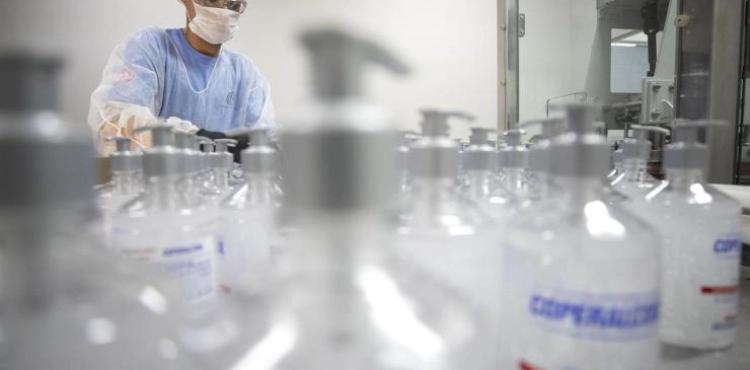The Bistro Star factory for the production of high-quality bakery fillings owned by the Pico family in Laurel, Maryland, has turned into a workshop for the production of hand sanitizers in light of the spread of the Corona crisis.
Prior to the Covid 19 outbreak, the Bistro Star factory, which was founded in the United States in 1986, was providing a wide range of bakery fillings and providing various companies with its various products.
But since the outbreak of the deadly virus, employees have stocked sugar bags, caramel bowls and giant almond paste cans to provide space for isopropyl alcohol and glycerin.
There is a huge demand for hand sanitizers, which has led the Pico family to try to help meet the growing demand.
"For us, it is very easy to manufacture," said Frenchman Mirai Picot, who founded "Bistro Star" with her husband.
She explained that the company obtained the approval of the US Food and Drug Administration (FDA) for the disinfectant formula in "less than two weeks".
But the big problem was finding the right bottles and caps. Another problem was obtaining chemicals, as the prices of disinfectant ingredients rose four times as the crisis continued.
The Pico family will not change its line of work, and the manufacture of hand sanitizers is only a temporary matter, as it is a way to keep the company operational as demand for its regular products falls.
The factory sold at least 4,500 bottles of hand sanitizer in two weeks. But demand for these products could rise quickly as more US states move toward re-opening.
The beginning of the year 2020 was good for "Bistro Star".
From late February to early March, just before the outbreak of the virus crisis, the company´s sales rose 35%, a record high.
This is thanks to Cruise Lines, a major customer of the Pico family, supermarkets that sell high-end products such as Whole Foods and the Cisco wholesale distributor selling pastry star products to luxury restaurants across the United States.
But in mid-March, everything stopped when strict measures were imposed to limit the spread of the virus.
"Sales have reached their lowest levels and have been around zero for three to four weeks," said Antonin Picot, 27, who took over the daily operations of the family’s company nearly a year ago.
"We have gone through crises in the past, such as the September 11 attacks, Hurricane Katrina, and the Great Depression, but we have never seen a cessation of our daily business," said his mother, Mirai.
The family gathered around a table to discuss the future, as Antonin narrated. He continued, "We said that we must either close our doors or keep the company and innovate so that we can keep our employees at work."
After this meeting, the company created the "Patch and Paik" concept, which is boxes of ingredients that home cooks can use to make baked goods.
Kristen Gegrich, a 30-year-old pastry chef, works at "Bistro Star" in her laboratory to finalize a home-made product.
"We´re trying to be more creative to reach ordinary people rather than just big customers," she explained.
Cardboard boxes contain pre-measured ingredients and shipped in a special container to keep them fresh so that home-quarried residents can make candy bars, cakes, cookies and bread.
All the olives have to do is follow the recipe created by Gigrich. The blonde chef, who wears a mask, explained that the recipes were tested in real-life conditions at home, and were not tested in a sophisticated oven with professional tools.
These funds may find their customers, especially when it becomes difficult to obtain flour in some supermarkets.
"E-commerce will be a precedent for us," said Antonin Picot.
"We are targeting the urban residents who have traveled and who have tasted the French bakery," he said, noting that he sees this crisis as an opportunity for his company to develop.
However, the future of his employees is uncertain and some are concerned. Many of them have been forced to remain quarantined after showing symptoms of the Coronavirus.
But the Pico family and its team are still optimistic and believe the coming days will be better.
"The good thing about making foods is that people always need to eat," said Gigrich with a smile.












